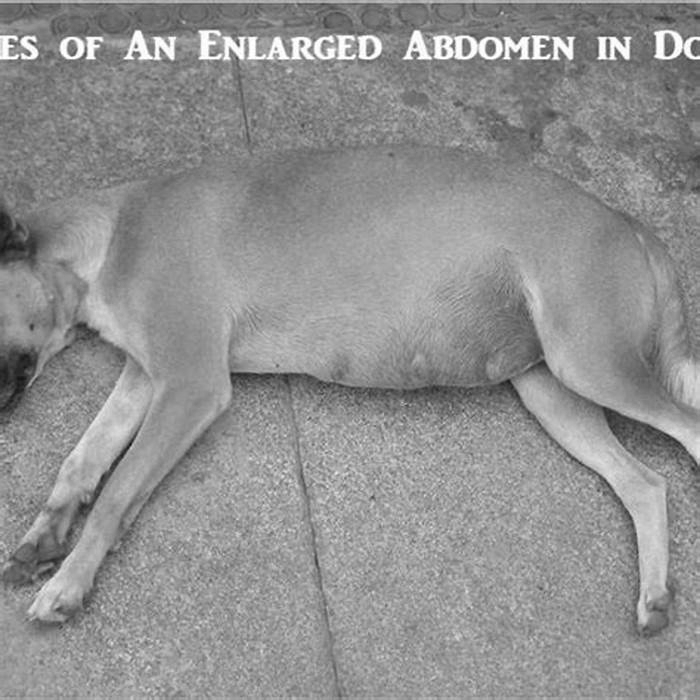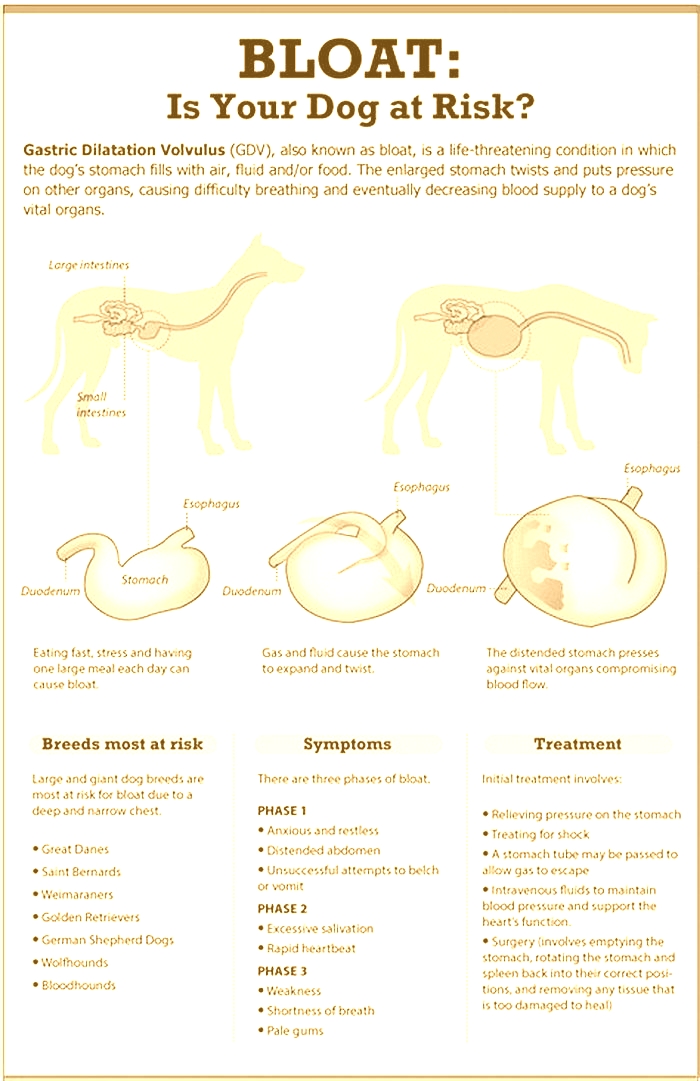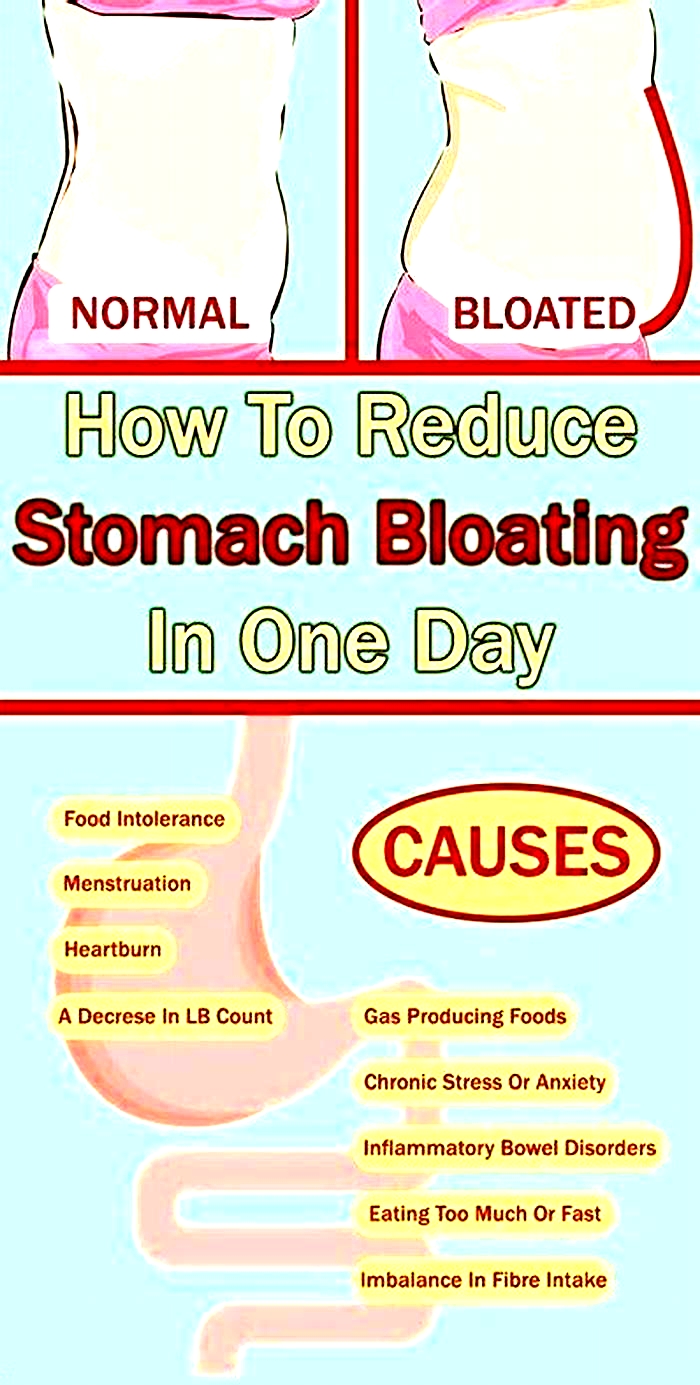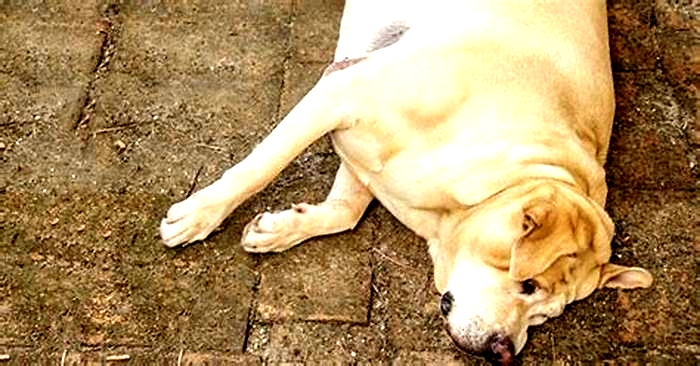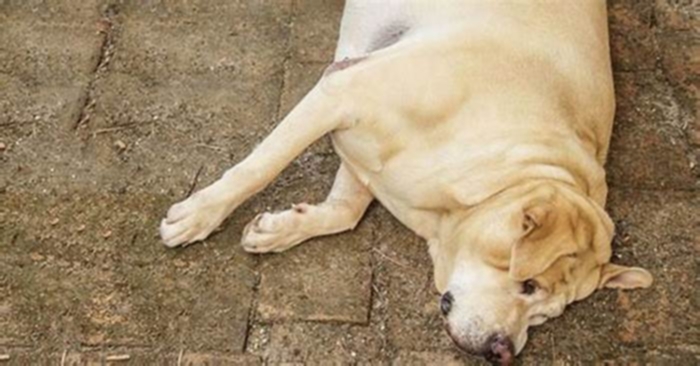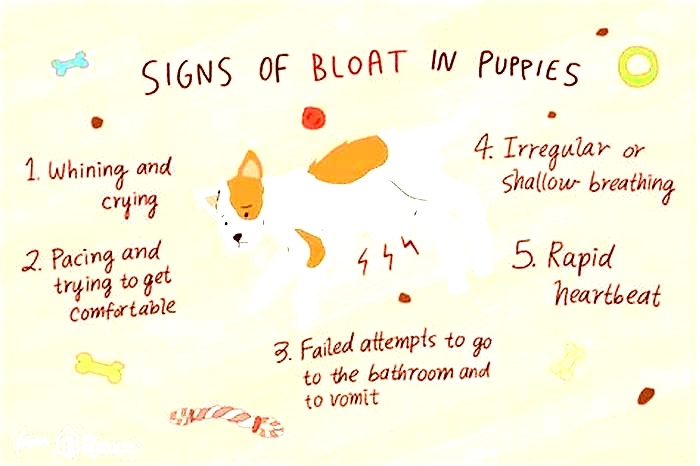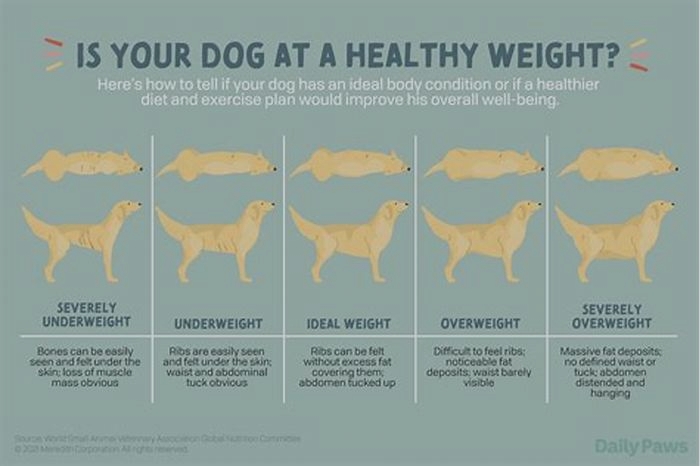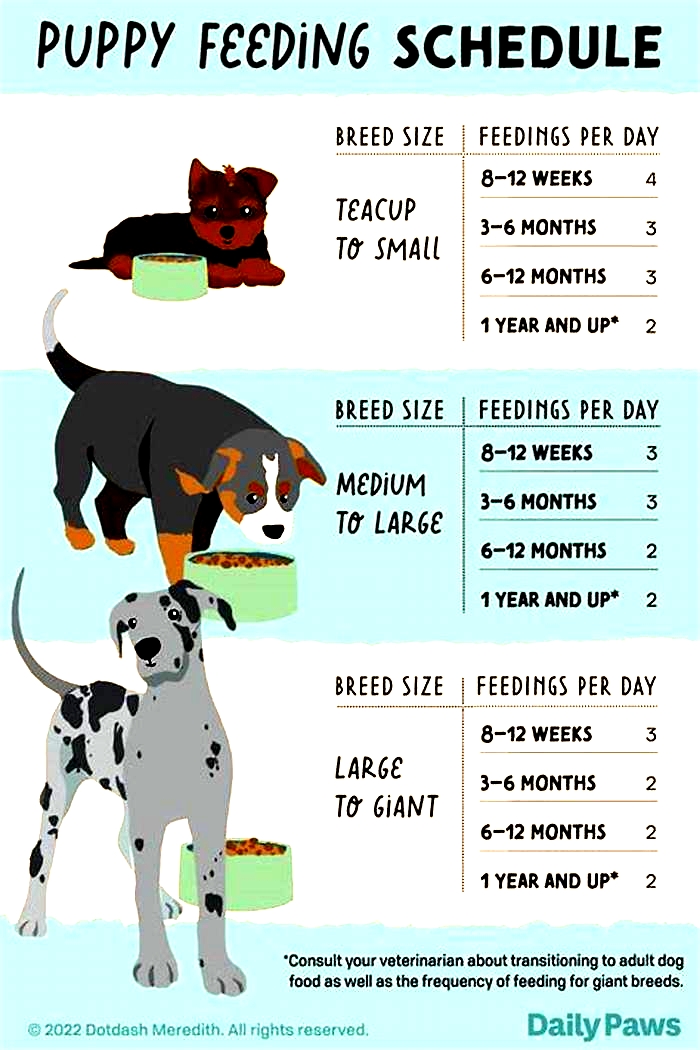Will a dogs bloated stomach go away
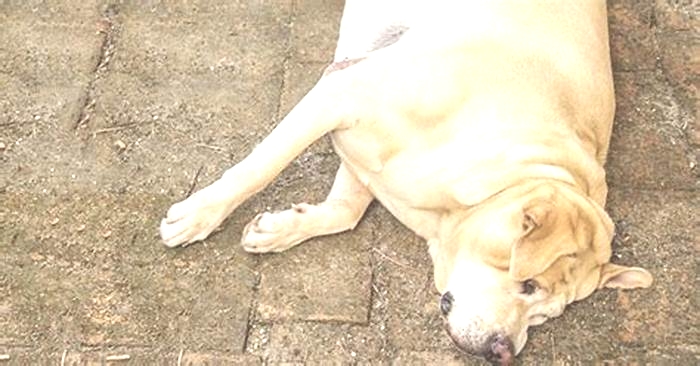
Causes and Symptoms of Bloat in Dogs
What is Bloat?
In a simple bloat situation, a pet has often ingested a large volume of food or other material (such as dog food, bread dough, foreign material, etc), or has a stomach full of air. When this happens, it causes the stomach to stretch like a balloon and can become very uncomfortable for the pet. Although this is quite uncomfortable, its not typically a life-threatening condition at this stage. However, due to the stomach enlarging, it can twist on itself inside the abdomen which cuts off the blood supply to numerous organs. When this happens, it is then called gastric dilatation and volvulus (GDV). Because of the loss of oxygen to numerous organs and the damage that is done when the stomach enlarges and twists, this condition is often fatal and requires immediate medical attention.
What breeds are at risk for bloat?
Many people with pets have heard of the dreaded bloat in dogs. Bloat most commonly affects large breeds like Great Danes, German Shepherds, Mastiffs, and other deep-chested dogs. However, any dog can become bloated.
Top Causes of Bloat in Dogs
1. Intestinal Parasites
Have you ever heard someone refer to a puppys appearance as having a wormy belly? Thats because many intestinal parasites cause a bloated appearance to the abdomen of young puppies. These parasites commonly include hookworms and roundworms and are often found by vets on a fecal screening test.
Some symptoms you may encounter are round long worms in the stool or vomiting worms up. You may also notice a poor haircoat, pale gums, or diarrhea (with or without blood). Generally, intestinal parasites are a treatable condition with proper deworming and can be corrected easily if diagnosed early.
2. Dietary Indiscretion and Overeating
Did your puppy get into a large bag of dog food? Did they swallow a ridiculous amount of dirt or ingest your toddlers Play-Doh? Dogs really do eat some weird things. And if eaten in large enough volume, can cause a significant and very uncomfortable distention of the stomach.
In most cases, the food will be digested (sometimes very slowly). Your puppy may still need supportive care, including hospitalization and IV fluids. In more serious cases, especially in the case of swallowing things like stuffing from a dog bed, or mulch in the yard, surgery may be needed to remove the foreign material.
Other possible causes of an enlarged stomach may include decreased gastrointestinal motility (slow intestinal movement), or even constipation. Your vet will need to examine your dog to determine if additional testing, like blood work or x-rays, are needed to uncover the cause of her bloated stomach.
3. Abdominal Fluid
Another reason why a dogs abdomen will swell up is ascites, also known as abdominal effusion. This is described as the accumulation of fluid inside the abdominal cavity. Depending on the volume, the dogs abdomen can increase in size mildly or to the extent where they start to look pot-bellied.
Although less common than the first two causes, fluid in the abdomen can certainly lead to a distended or bloated appearance. This can be from a variety of problems including heart failure, low body protein (sometimes due to problems with the liver or kidneys), cancer, and even bleeding from other organs. Free abdominal fluid occurs more commonly in older dogs and is often associated with more severe disease.
Treatment options depend on the underlying cause. Identifying the type of fluid as well as making sure the dog is stable is the first step in diagnosing most underlying conditions.
4. Gastric Dilatation and Volvulus (GDV)
Known as The mother of all emergencies in veterinary medicine, GDV is an extremely dangerous condition in which the stomach fills with air, and then twists on itself inside the abdomen. This leads to a distended appearance of the dogs torso and is often accompanied by a distressed appearance, heavy breathing, and attempts to vomit. In some cases, the stomach is filled with air but hasnt twisted yet (Gastric Dilatation) and imaging is required for further evaluation (like x-rays).
Read more about GDV, here!
5. Hyperadrenocorticism (Cushing's disease)
Hyperadrenocorticism, also known as Cushings disease is commonly triggered by hormone-producing tumors in the adrenal glands or pituitary glands. This results in a wide range of clinical signs which can be tricky to detect. Dog's with Cushing's disease typically have a pot-bellied appearance due to weakened abdominal muscles that result from the body's overproduction of cortisol.
What should I do if my dog's stomach looks bloated?
Due to the wide variation in conditions causing a bloated stomach appearance, its recommended that medical care be sought early. Your vet will perform an exam and discuss further tests or treatments based on their findings. Early intervention can be lifesaving, and your pet will thank you for it!
Contact your vet or take your dog to an emergency clinic if she is showing any of these signs:
- Distended, hard abdomen
- Sudden onset of frequent vomiting, gagging, or retching (nonproductive vomiting)
- Drooling excessively (hypersalivation)
- Signs of distress including heavy panting, pacing, or inability to rest
- Weakness, decreased ability to walk or stand
- Pale or purple gums
Read more:
Why does my pet need an abdominal ultrasound?
Why does my pet need x-rays?
Why does my pet need a complete blood count?
Need to speak with a veterinarian regarding bloating in your dog or another condition?
Click here to schedule a video consult to speak to one of our vets. You can also download the FirstVet app from the Apple App Store and Google Play Stores.
Bloat (or GDV) in Dogs: What Is it and How Is it Treated?
If you believe your dog is suffering from symptoms of bloat, call your vet or emergency vet immediately.
I hate this disease. When I first started as a vet, we gave a dog with bloat a 50-50 chance if he could walk into the hospital. Many were too weak and had to be carried in. They often died. Now, 30 years later, bloat still kills about 30 percent of the dogs it affects, even after extremely intensive treatment.
I hope you never see this disease in your dog, but learning about what it is, why it happens, and how its treated may help your dog fall into the percentage of dogs that survive. Read on for common questions about bloat and new perspectives on prevention.
What Is Bloat in Dogs?
Bloat, also known as gastric dilatation-volvulus (GDV) complex, is a medical and surgical emergency.
As the stomach fills with air, pressure builds, stopping blood from the hind legs and abdomen from returning to the heart. Blood pools at the back end of the body, reducing the working blood volume and sending the dog into shock.
If this isnt enough, there is yet another scary thing that happens, and it is devastating to see. As the stomach flips, it drags the spleen and pancreas along with it, cutting off the blood flow. The oxygen-starved pancreas produces some very toxic hormones. One, in particular, targets the heart and stops it cold. In fact, a dog can go through successful treatment and seem to be out of danger, when suddenly the heart stops.
Even in the mildest case of bloat, which is extremely rare, dogs die without treatment.
What Are the Signs of Bloat in Dogs?
- An enlargement of the dogs abdomen
- Retching
- Salivation
- Restlessness
- An affected dog will feel pain and might whine if you press on his belly
Without treatment, in only an hour or two, your dog will likely go into shock. The heart rate will rise and the pulse will get weaker, leading to death.
Why Do Dogs Bloat?
This question has perplexed veterinarians since they first identified the disease. We know air accumulates in the stomach (dilatation), and the stomach twists (the volvulus part). We dont know if the air builds up and causes the twist, or if the stomach twists and then the air builds up.
How Is Bloat Treated?
Veterinarians start by treating the shock. Once the dog is stable, hes taken into surgery. We do two procedures. One is to deflate the stomach and turn it back to its correct position. If the stomach wall is damaged, that piece is removed. Second, because up to 90 percent of affected dogs will have this condition again, we tack the stomach to the abdominal wall (a procedure called a gastropexy) to prevent it from twisting.

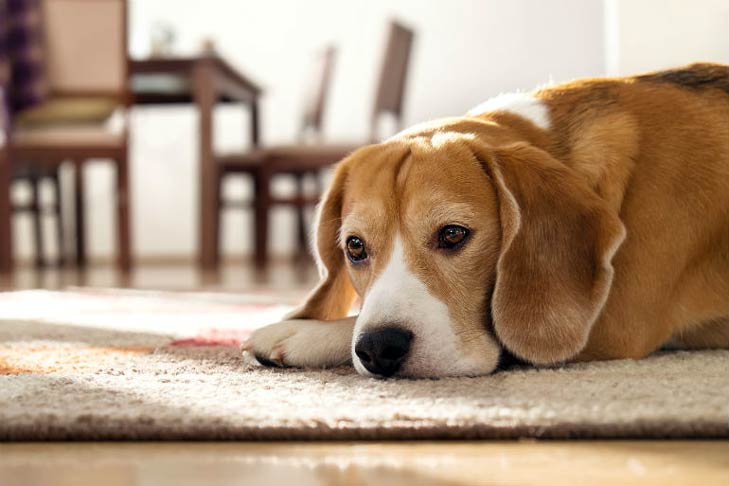
How Can Bloat Be Prevented?
For years, veterinarians have been looking for ways to prevent bloat. If you search on the Internet, you will find a host of suggestions, but much of it is folklore. We have to look at what is scientifically proven and implement those strategies.
Risk of bloat is correlated to chest conformation. Dogs with a deep, narrow chest very tall, rather than wide suffer the most often from bloat. Great Danes, who have a high height-to-width ratio, are five-to-eight times more likely to bloat than dogs with a low height-to-width ratio.
In addition to Great Danes, large- or giant-breed dogs at greatest risk include St. Bernards, Weimaraners, Irish Setters and Gordon Setters, Standard Poodles, and Doberman Pinschers. Males are twice as likely to bloat as females. Neutering or spaying has no effect on risk.
If a dog has relatives (parents, siblings, or offspring) who have suffered from bloat, there is a higher chance he will develop bloat. These dogs should not be used for breeding.
Certain dietary ingredients have been blamed over the years, but the data is inconclusive. This is because most large-breed dogs are fed a cereal-based diet, so making a statement that those diets are to blame is difficult. However, we do know that foods containing soybean meal or having oils or fats in the first four ingredients increase the risk by fourfold.
Over the years, I have seen studies that show that food bowls on the floor cause more cases of bloat, but a few years later this was debunked, and elevated food bowls are now known to be just as much of a risk. With these conflicting results, a solid recommendation cant be made.
Dogs fed one meal a day are twice as likely to bloat as those fed two meals a day. Rate of eating is also a contributor. Fast eaters have five times the risk than dogs that are slow eaters. Using slow feeder bowls with fingers (or center posts) or putting large rocks in the bowl slows dogs down physically, but its also important to address the anxiety that comes with feeding around other dogs, because that can be a risk factor. Stressed dogs and those that are hyperactive are more likely to bloat. Separating dogs at feeding times may help reduce anxiety and stress surrounding food. Unhappy or fearful dogs are twice as likely to bloat as those that are happy.
A recent trend is to perform a preventive surgical gastropexy on an at-risk dog. Often performed when a dog is sterilized, some veterinarians now do this procedure laparoscopically to reduce the invasiveness. Unfortunately, the hardest part is determining which dogs are at a high enough risk to warrant this surgery. It could be said that all the above-mentioned breeds should have this surgery performed. We just dont know if it is cost-effective. Consult with your veterinarian about this option.
We cant prevent all cases of bloat, but by implementing some of the above techniques, you may be able to reduce your dogs risk. If your dog shows signs of bloat, take him to a veterinarian or an emergency pet clinic immediately.
Dog Bloated Stomach Home Remedies [Tips & Prevention Guide]
If you own a dog or are around them often you may notice they flatulate just like us. Besides the pungent smell, there is nothing wrong with a little gas. However, gas builds up pressure, and if it can't release issues may arise. If the gas can't release it causes bloat. This can be a dangerous situation for dogs if not handled urgently by a professional. Becoming aware of the symptoms and what you can do to help may prove vital if your dog experiences bloat. Luckily, there are some home remedies for dogs who tend to have a bloated stomach. And being proactive might be the best way to combat this problem.
What Exactly is Bloat in Dogs?
Bloat usually begins when a dog's stomach gets distended with gas, which can cause it to twist. As the twisting occurs, the esophagus closes up, not allowing the dog to relieve the pressure by vomiting, burping or passing gas.
With bloat comes added pressure to the veins and organs, including the spleen, liver, and pancreas. Because these veins are incapable of performing their necessary functions, there is an insufficient amount of blood reaching the heart. The pressure makes dogs susceptible to undergoing cardiac arrest or shock.
Bloat can be harmful because a twisted stomach shuts off the blood supply, which causes issues in the cells of the stomach lining. During the damage of these cells, harmful toxins, which can cause blood poisoning, are released. On some occasions, bloat will cause a dog's stomach to rupture. If you think your dog is hurting from stomach bloat, you should take them to a vet immediately.
What Are the Causes of Bloated Stomachs in Dogs?
Generally, several reasons cause dogs to develop bloat. Although many reasons are unknown, there are certain links between dogs with stomach bloat and factors like:
Breeds
There are links that connect stomach bloat with the type and size of a dog. Larger dogs are said to be more susceptible to experiencing bloat than smaller dogs. Some larger dog breeds that are more likely to develop bloat include German Shepherds, Doberman Pinschers, Boxers, Great Danes, Akitas, Sheepdogs, and Basset Hounds.
Studies show that pure-bred dogs are also 2.5 times more prone to develop bloat when compared to mixed breeds. According to the World Canine Association, there are 340 different types of dog breeds, unfortunately, some breeds are healthier than others.
Gender and Age
Dogs between 2 and 10 years old are at higher risk of developing bloat. Male dogs are also twice as likely to experience it when compared to female dogs.
Eating Habits
Certain eating habits can lead to stomach bloat in dogs. Dogs that eat too fast or eat once a day are said to be twice as likely to develop it compared to those who eat slower (slow feed bowls can help) and eat twice a day. Eating smaller, spaced-out meals helps a dog not be too hungry, which supports slower eating.
Temperament
Just like in humans, stress can cause a world of trouble for dogs including abdomen discomfort and bloat. Dogs who are overly stressed,fearful, or areaggressivetend to contract bloat easier. To combat this some owners try promoting a calm state of mind and body by giving their dog natural calming remedies, likeChamomile,L-Theanine, or CBD dog treatsto relax the mind and body.
Type of Food
Dry dog food or food that expands in the dog's stomach can cause bloat. Although there isn't much research surrounding the effects of homemade dog food and bloat, several holistic veterinarians have said meals prepared at home can significantly reduce stomach bloat in dogs. However, you need to be selective about what ingredients you feed dogs because certain foods can actually cause excess gas and lead to bloat, like beans and cheese.
Some research suggests that organic dog food may result in less stomach issues than non-organic although you should still be selective to avoid gas-promoting foods and foods that are harmful for dogs.
Exercise
Dogs that are too hyperor become active too fast right after a meal might also be at risk of developing stomach bloat.
Remember, since bloat can be harmful, it's best not to try and diagnose the problem or cause on your own. If your dog's abdomen looks swollen, take your dog to an animal hospital or emergency veterinarian as soon as possible. After diagnosis, if you know your dog is susceptible, ask your vet advice about any home remedies that may reduce a dog's bloated stomach.
WHAT ARE THE SYMPTOMS OF STOMACH BLOAT IN DOGS?
The symptoms of stomach bloat in dogs are different for each dog. Sometimes the symptoms of canine bloat aren't immediately visible. It might take the condition to be in its later stages for a dog's stomach to be noticeably distended or swollen.
Symptoms that a dog has bloat can include:
- Acting restless
- Pacing without stopping
- Drooling and salivating
- Stressed
- A swollen stomach
- Gagging or trying to vomit without success
Some of the most common things to notice for stomach bloat in dogs are gagging, excessive salivating and restlessness. Their stomach is swollen, and when touched, the dog might groan or yelp from the pain. The dog might also start to pace while trying to vomit without success.
If a dog with stomach bloat is frantically walking around some signs to watch out for are a hanging head, stiff-leggedness, and displays of discomfort. Another way to find out whether a dog has bloat or not is if there's a hollow sound coming from their abdomen after gently touching it.
Dogs should have a trim enough figure so that when you stand above them, their waist is visibly noticeable. Even looking at them from the sides, their waist should be visible, tucked behind their hind legs.

If you can't see their waste from any direction, your dog might be overweight and looking for stomach bloat can be a bit more complicated. However, if the stomach size suddenly and drastically increases, a dog could be experiencing bloat.
Signs that stomach bloat has progressed in a dog include the gums and tongue appearing pale, a weak pulse or an increased heart rate. Usually, at this stage, dogs might have difficulty breathing, become weak, and could go into shock.
HOW TO PREVENT BLOAT IN DOGS
Avoiding bloat in dogs altogether can be tricky since there's a lot of moving parts to the condition.Switching your dog to a raw diet, noticing poor eating habits and monitoring their exercise times can all be beneficial.
Raw Diet
The digestive tract in dogs is ideal for breaking down protein, and not so much for grains and starches. Processed dog food like kibble, premixes, and synthetic vitamins contain carbs your dog doesn't need.
Research suggests dog food that features rendered meat meal with bone and fat in the first four ingredients drastically increases your dog's risk of developing bloat. These benefits make raw diets optimal for preventing bloat.
Raw bones also offer many nutrients that are great for cleaning a dog's teeth. Some bones help strengthen a dog's stomach muscles, which can improve digestion and reduce gas buildup.

Elevated Bowls
Interestingly, there is a lot of controversy surrounding the topic of using raised bowls. While there's no evidence backing elevated bowls, there is a study that found that "in 20% of cases among large breed dogs and in 52% of cases among giant breed dogs, the bloat was actually directly related to having a raised food bowl."

Exercise
Exercise is essential, but it might not be when it comes to bloating. All dogs need it, but the level and type vary depending on the dog. Although several people swim after they eat and live to tell the story, that same line of thinking might not work for dogs.
When their stomachs are full, it's more likely to move and twist, which can lead to issues in their digestive systems, like bloat. Allowing them to become too active right after a meal is not a good idea. Most research suggests waiting at least 30 minutes before high activity or exercise.

HOME REMEDIES FOR BLOATED STOMACH IN DOGS
Because the cause and explanation of bloat are not clear, narrowing down specifichome remedies for stomach bloat in dogscan be tough. What we do know is bloat happens when the stomach gets filled with too much gas. Unlike with balloons, there is little to no room for expansion when it comes to the stomach. Gas inside a dog's stomach has little space to sit, causing uncomfortable pressure on other internal organs.
 When it comes to using home remedies to prevent stomach bloat naturally, here are a few things you can try:
When it comes to using home remedies to prevent stomach bloat naturally, here are a few things you can try:
- Using a slow feed bowl if your dog tends to eat too fast
- Opting for smaller, spaced out meals
- Keep their level of activity to a minimum right after meals
Owners know their dogs better than anyone. So, it's really up to them to notice any abnormalities in their behavior due to illness. When it comes to dog bloat, having doubts is understandable, but it's also not a reason to leave those doubts unattended. If you have doubts, go with your gut and take the steps you think are in thebest interest of your dog's health.
If you think your pet has a medical emergency, call or visit your veterinarian or your local veterinary emergency hospital immediately. This Content is not intended to be a substitute for professional veterinarian advice, diagnosis, or treatment. Always seek the advice of your veterinarian with any questions you may have regarding the medical condition of your pet. Read more infohere.



